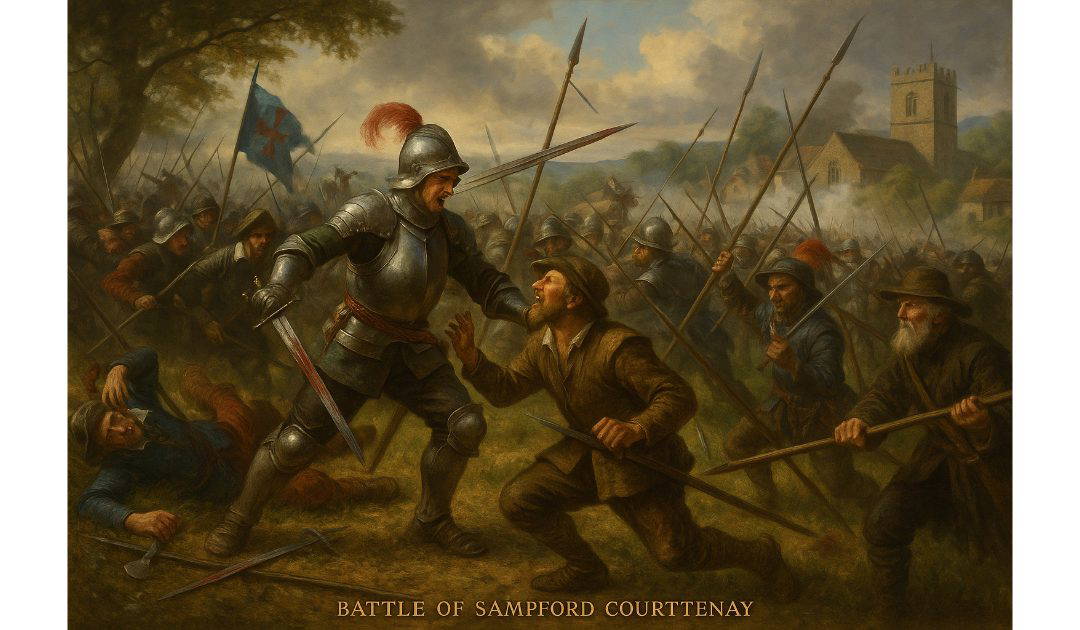On the 17th of August, 1549, the Battle of Sampford Courtenay was fought, and the Prayer Book Rebellion was quashed. The Prayer Book Rebellion features in A Woman of Noble Wit by Rosemary Griggs, who I met at the Dartmouth Book Festival last year. I heartily recommend it.
The Prayer Book Rebellion, also known as the Western Rebellion, was a significant uprising that took place in the summer of 1549 during the reign of Edward VI. Rooted in religious, social, and economic grievances, the rebellion primarily unfolded in Devon and Cornwall, regions with strong ties to traditional Catholic practices. The introduction of the English Book of Common Prayer, mandated by the Act of Uniformity in 1549, served as the catalyst for widespread discontent.
Under Edward VI, the English Reformation progressed rapidly, moving England further from Catholic traditions. The Book of Common Prayer, crafted by Archbishop Thomas Cranmer, replaced Latin with English in church services. For communities in Devon and Cornwall, where many people still spoke Cornish and had deep-rooted Catholic beliefs, these changes were not merely religious reforms but an erosion of their cultural and spiritual identity.
The rebellion began in Cornwall, where parishioners in the village of Sampford Courtenay insisted on continuing the traditional Latin Mass. When their demands were dismissed, tensions escalated, leading to open defiance against the imposition of the new prayer book. The unrest quickly spread into Devon, galvanising communities with shared grievances about religious reforms, land enclosures, and economic hardships.
A pivotal moment in the rebellion occurred with the murder of William Hellyons, a local farmer in Devon. Hellyons was known to support the government’s religious changes. When he attempted to quell the gathering rebels or possibly oppose their cause, he was confronted and killed. This event marked a turning point, transforming the rebellion from scattered protests into an organised insurrection. Hellyons’s death symbolised the deepening divide between reform supporters and traditionalists, intensifying the violence and resolve among the rebels.
Following this escalation, rebel forces amassed in significant numbers, laying siege to Exeter. The rebels’ demands were clear: the restoration of the Latin Mass, the reinstatement of traditional Catholic practices, and the reversal of recent social and economic reforms. The government, perceiving the rebellion as a direct threat to its authority and the Protestant reformation, responded with decisive military action.
At the forefront of the rebel leadership was Humphrey Arundell. Born into a well-established family from Cornwall, Arundell served as a former soldier and a member of the local gentry. His military background and leadership skills made him an ideal figure to command the rebels. Arundell’s motivations probably stemmed from both personal convictions and a sense of duty to defend the traditional faith and local customs under threat.
Arundell effectively organised the rebel forces, coordinating their movements and strategies. His leadership helped sustain the rebellion through numerous skirmishes and battles. Despite facing professional soldiers led by experienced commanders such as Lord John Russell, Arundell’s forces demonstrated resilience and determination.
However, the rebellion faced insurmountable challenges. The government dispatched a large army, bolstered by foreign mercenaries, to suppress the uprising. After fierce battles at Fenny Bridges, Clyst St Mary, and Sampford Courtenay, the rebels were decisively defeated. The aftermath was brutal: thousands of rebels were killed, either in battle or through subsequent reprisals.
Humphrey Arundell was captured, tried for treason, and executed in early 1550. Despite the rebellion’s failure, its legacy endured. The harsh government response highlighted the deep divisions within English society over religious reform and governance. Additionally, the rebellion underscored the importance of local identities and the resistance to centralised authority, especially in regions with distinct cultural and linguistic heritage.
The Prayer Book Rebellion remains a poignant episode in English history, reflecting the tumultuous period of the Reformation. It illustrates how top-down religious and political changes can provoke fierce opposition when they conflict with deeply held beliefs and local traditions.

